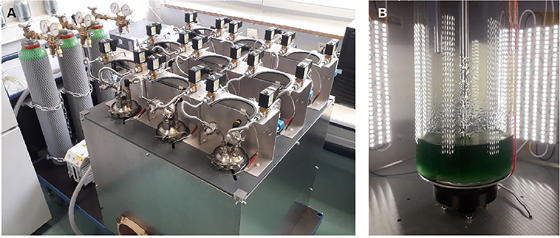Research shows that a species of algae may also be able to photosynthesize on Mars, raising expectations for terraforming

Frontiers | A Low-Pressure, N2 / CO2 Atmosphere Is Suitable for Cyanobacterium-Based Life-Support Systems on Mars | Microbiology
https://www.frontiersin.org/articles/10.3389/fmicb.2021.611798/full
Biotech fit for the Red Planet | EurekAlert! Science News
https://www.eurekalert.org/pub_releases/2021-02/f-bff021221.php
The atmosphere on Mars is 95% carbon dioxide and 3% nitrogen, but cyanobacteria can take up both and utilize them by carbon fixation and nitrogen fixation . However, the atmospheric pressure on Mars is about 6hPa to 11hPa, which is about 1/100 of that of the earth, and cyanobacteria are not sufficiently metabolized under such conditions. Recreating the Earth's atmosphere on Mars is also technically difficult, so scientists have steered in search of cyanobacteria that can grow on Mars.
Scientists have developed a bioreactor ' Atmos ' that can reproduce a low voltage of 100 hPa. Nine containers made of glass and steel were placed inside, the inside was filled with nitrogen and carbon dioxide, and a medium containing nutrients such as phosphorus, sulfur, and calcium, which are thought to exist in the sedimentary layer of Mars, was installed. ..

Next, '

Scientists have also succeeded in drying the grown Anabaena genus and using it as a substrate for E. coli. This demonstrates that the sugars and amino acids from cyanobacteria can nourish other bacteria, and scientists say they can also make food and medicine on Mars.
Scientists have stated that they need to experiment under conditions closer to Mars, and will continue to study other species of cyanobacteria and other nutritional conditions.
Related Posts:







